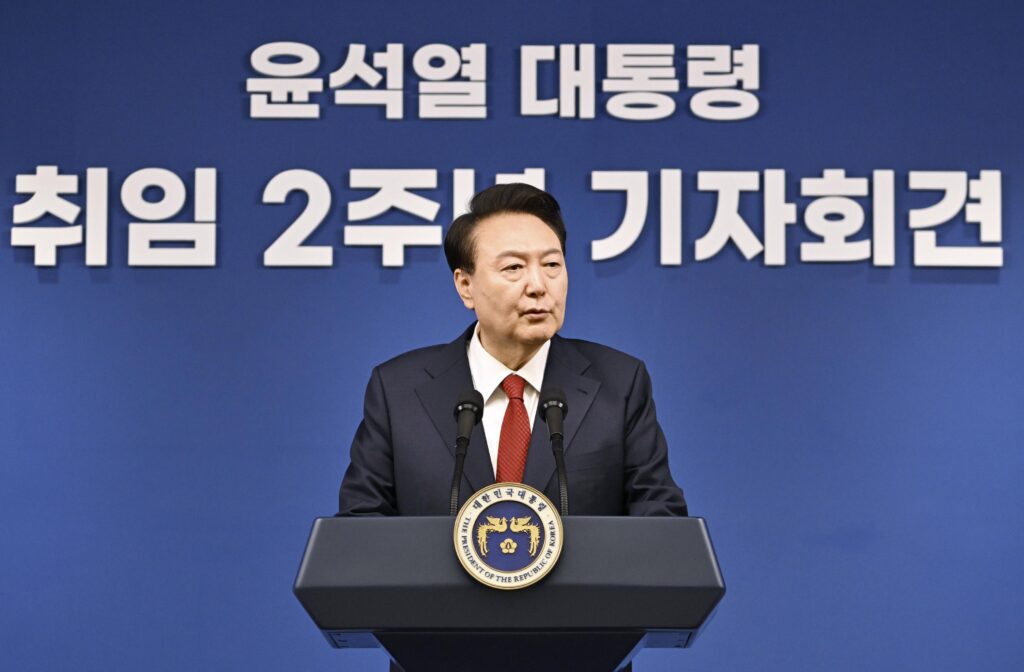South Korean President Yoon Suk Yeol has grappled with a divided government since his election in 2022. Fuelled by a contentious relationship with the opposition-controlled National Assembly, the legislative process has devolved into what is sometimes called a ‘vetocracy’ — dysfunctional rule by veto.
The Yoon administration has hoped that conservatives would retake the Parliament for the first time since 2012 and finally break through the gridlock. But his People Power Party (PPP) was trounced by the opposition, which won 192 out of 300 National Assembly seats in the 10 April elections. Though the Democratic Party of Korea (DPK) and its allies in opposition fell short of a veto-proof two-thirds majority, Yoon is now the only South Korean president to govern without a legislative majority for the entirety of a 5-year presidential term.
In the six weeks since the electoral defeat, the government has attempted to improve its political communication. President Yoon acknowledged that his administration was inadequate in both communicating its policies and listening to voters’ concerns. On 29 April 2024, he held his first official meeting with DPK leader Lee Jae-myung and has expressed openness to meeting with other opposition parties’ leaders. On 9 May, Yoon held a formal press conference marking the second anniversary of his presidency. At the conference, Yoon publicly acknowledged his past shortcomings to the press, and responded to a wide range of questions on domestic and foreign policy issues. He pledged to be more responsive to domestic challenges such as the declining birth rate, describing it as a ‘national emergency’ and announcing that a new cabinet ministry would be established to tackle the issue.
The President has also sought to partially compromise with the opposition’s demands. Following the April elections, the PPP and the DPK approved a special investigation into the October 2022 crowd crush in central Seoul that killed nearly 160 — mostly young — people. Yoon previously vetoed similar legislation but is supportive of this bipartisan deal.
But the electoral defeat does not mean Yoon will cede ground on every issue. The President has reiterated his opposition to the DPK’s cash handout plan that would see each citizen receive 250,000 won (US$183). The administration also remains unamenable to opposition parties’ demands for special investigations into the allegations surrounding First Lady Kim Keon-hee and the drowning of a South Korean marine in 2023.
While Yoon publicly apologised for his wife’s conduct, he has already vetoed a special counsel bill that would trigger an investigation of her. On 21 May, Yoon also vetoed a bill passed by the National Assembly on mandating a special probe into the marine’s death. Yoon has reiterated special probes are unnecessary and premature, as police and the Corruption Investigation Office for High-ranking Officials are already conducting investigations.
The opposition has criticized the Yoon government’s post-election statements and activities as insincere and inadequate. They warned that the President’s continued use of the veto power will escalate confrontations with the National Assembly, even threatening the possibility of impeachment.
On foreign policy, Yoon sought to reassure concerns about his government’s strategic alignment with the United States and Japan. At his press conference, he said South Korea would manage relations with Russia ‘as amicably as possible’ and pursue bilateral cooperation on a ‘case-by-case basis’. Yoon also reiterated Seoul’s restraint in sending lethal aid directly to Ukraine in its war against Russia. The Ministry of Foreign Affairs announced in a separate statement that Seoul would host a trilateral summit with Japan and China at the end of May — the first such summit since 2019.
But Yoon’s detente with the Japanese government, could become even harder for the administration to defend after a hacking incident led Tokyo to demand that South Korean tech company Naver sell its shares in Line Yahoo — Japan’s leading messaging service. This has galvanized the opposition’s criticism that South Korea has little to show for its efforts to improve relations with Japan.
The public reaction to Yoon’s press conference has so far been cool. His approval rating cratered to a new low immediately after the election and remains below 30 per cent. The majority of voters support the opposition’s calls for special investigations — a risk to the Yoon administration if it hopes to signal improved political responsiveness. Yoon has an opportunity to demonstrate his commitment to change when he nominates a new prime minister possibly in June 2024. This nominee must receive strong public support as the nomination is subject to confirmation by the National Assembly.
President Yoon’s political challenges might be compared with those faced by then-US-president Bill Clinton after his Democratic Party lost both houses of Congress in the 1994 midterm elections. The Clinton administration responded with the ‘triangulation’ strategy in which it compromised with the Republican-controlled Congress on some policy issues while maintaining confrontation on others.
Yoon must similarly balance compromise and confrontation with the opposition. It remains to be seen whether he can effectively communicate his renewed commitment to cooperation with the legislature and societal groups, while successfully defending his administration from what he perceives as politically motivated attacks from the opposition.
If Yoon fails, he risks a years-long lame-duck presidency. But if he convinces the public that the opposition is more responsible for the partisan gridlock, the shift in public opinion could provide crucial leverage for his government to achieve meaningful political ‘wins’ — even in a divided government.
Jong Eun Lee is Assistant Professor of Political Science at North Greenville University.

